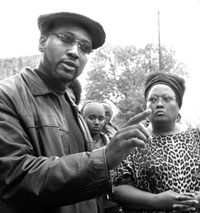
CHICAGO (FinalCall.com) – The son of a Black Panther leader who was killed by law enforcement officials in the 1960s says those same forces recently attempted to kill him.
Fred Hampton, Jr., whose legendary father was assassinated Dec. 4, 1969 alongside fellow Panther Mark Clark, says his continued activism and revolutionary fervor have brought the same enemies his father had and the same tactics.
Mr. Hampton, Jr. told The Final Call shots were fired that shattered his back window Sept. 26 as he, his mother and another activist left a community meeting.
Though he has no physical evidence to prove it, the community organizer believes law enforcement personnel were responsible for the shooting. He spoke with The Final Call on Oct. 5 in an interview.
“I’ve witnessed intense signs of the state’s counterinsurgency efforts, from seeing an increased number of agent provocateurs to seeing marked and unmarked police cars trailing me to the most recent event, an attempt to assassinate me,” said Mr. Hampton, Jr. “There was an unmarked car not far ahead of us when this happened.”
According to Mr. Hampton, Jr., the group, including his mother, Akua Njeri and activist Sister Tuere, were riding on 55th St. on Chicago’s south side when four to five shots hit the back window of the car at about 8:50 p.m.
“The street was heavily populated, but the shots were quiet; the only sound was the shattering of the glass, with a slight pop that sounded like someone used a silencer. Even people in cars right next to us did not hear it,” he said.
After maneuvering the car off the main street and down several side streets, Mr. Hampton, Jr. said he managed to get the two women and himself to safety while escaping injury.
“Counterinsurgency is still alive and well. There’s no war on guns, gangs and drugs; it’s a war on us,” said the activist, who often speaks at hip hop conferences urging that community to organize for political empowerment. He also travels throughout the U.S. speaking out on the prison industrial complex and the U.S. government’s war on Blacks under the guise of drugs and gang violence. Many people become aware of his plight behind prison through a rap song by Dead Prez called “Behind Enemy Lines.”
Mr. Hampton, Jr. calls the episode the latest in series of attacks on his family. “My contact with the U.S. counterinsurgency started before I was born, when the Chicago Police Department, in collaboration with the federal government, attacked my parents Dec. 4, 1969,” he said.
Known as the “Massacre on Monroe,” the incident still evokes powerful emotions among activists and many in the Black community. His mother, who was pregnant with him at the time, survived the bloody assault, but was arrested. “My mother’s pre-natal care consisted not of a doctor’s stethoscope on her eight-and-a-half-month pregnant belly, but a policeman’s revolver being pressed there and him shouting,’‘Nigga, you better not run!” he said.
Outspoken and militant, Mr. Hampton, Jr. served jail time for torching a Korean store during the Rodney King rebellion. He maintains his innocence in that case. A past Final Call report found he was convicted through shaky eyewitness testimony and no physical evidence–not even a fire department report of a blaze.
“I’ve been harassed in every sense of the word,” said Mr. Hampton, Jr. “This country has a history of dealing with those who demand to be treated as human beings by slandering them, trying to buy them off, scaring them, forcing them into exile or by killing them.”
“If he feels the police were involved in any illegal activity, I encourage him to contact OPS (Office of Professional Standards). If he hasn’t he should file a police report,” said Chicago Police Department spokesperson Pat Camden, who was unaware of the incident.












